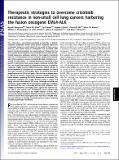Therapeutic strategies to overcome crizotinib resistance in non-small cell lung cancers harboring the fusion oncogene EML4-ALK
Author(s)
Katayama, Ryohei; Benes, Cyril H.; Lifshits, Eugene; Ebi, Hiromichi; Rivera, Victor M.; Shakespeare, William C.; Iafrate, A. John; Engelman, Jeffrey A.; Shaw, Alice; ... Show more Show less
DownloadKatayama-2011-May-Therapeutic strategi.pdf (1.164Mb)
PUBLISHER_POLICY
Publisher Policy
Article is made available in accordance with the publisher's policy and may be subject to US copyright law. Please refer to the publisher's site for terms of use.
Terms of use
Metadata
Show full item recordAbstract
The echinoderm microtubule-associated protein-like 4 (EML4)-anaplastic lymphoma kinase (ALK) fusion oncogene represents a molecular target in a small subset of non-small cell lung cancers (NSCLCs). This fusion leads to constitutive ALK activation with potent transforming activity. In a pivotal phase 1 clinical trial, the ALK tyrosine kinase inhibitor (TKI) crizotinib (PF-02341066) demonstrated impressive antitumor activity in the majority of patients with NSCLC harboring ALK fusions. However, despite these remarkable initial responses, cancers eventually develop resistance to crizotinib, usually within 1 y, thereby limiting the potential clinical benefit. To determine how cancers acquire resistance to ALK inhibitors, we established a model of acquired resistance to crizotinib by exposing a highly sensitive EML4-ALK–positive NSCLC cell line to increasing doses of crizotinib until resistance emerged. We found that cells resistant to intermediate doses of crizotinib developed amplification of the EML4-ALK gene. Cells resistant to higher doses (1 μM) also developed a gatekeeper mutation, L1196M, within the kinase domain, rendering EML4-ALK insensitive to crizotinib. This gatekeeper mutation was readily detected using a unique and highly sensitive allele-specific PCR assay. Although crizotinib was ineffectual against EML4-ALK harboring the gatekeeper mutation, we observed that two structurally different ALK inhibitors, NVP-TAE684 and AP26113, were highly active against the resistant cancer cells in vitro and in vivo. Furthermore, these resistant cells remained highly sensitive to the Hsp90 inhibitor 17-AAG. Thus, we have developed a model of acquired resistance to ALK inhibitors and have shown that second-generation ALK TKIs or Hsp90 inhibitors are effective in treating crizotinib-resistant tumors harboring secondary gatekeeper mutations.
Date issued
2011-04Department
Koch Institute for Integrative Cancer Research at MITJournal
Proceedings of the National Academy of Sciences of the United States of America
Publisher
National Academy of Sciences
Citation
Katayama, R. et al. “Therapeutic strategies to overcome crizotinib resistance in non-small cell lung cancers harboring the fusion oncogene EML4-ALK.” Proceedings of the National Academy of Sciences 108 (2011): 7535-7540. Web. 2 Dec. 2011. © 2011 New York Academy of Sciences
Version: Final published version
ISSN
0027-8424
1091-6490